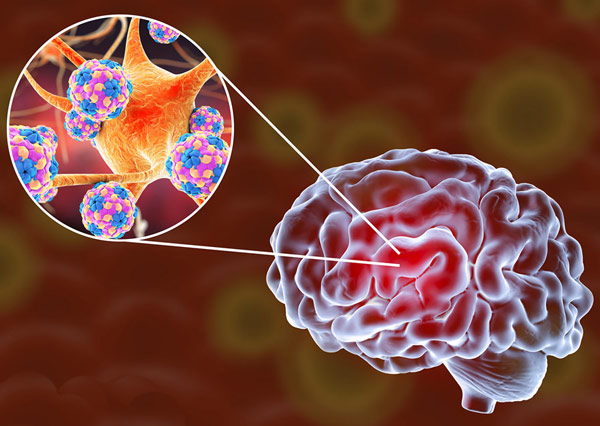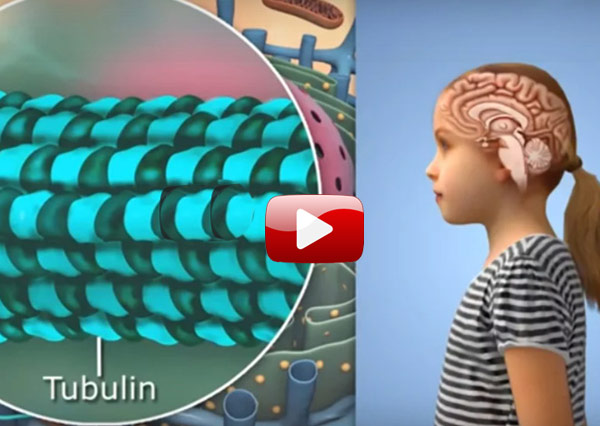PANS AND PANDAS
Autoimmune basal ganglia encephalitis
PANS and PANDAS have similar symptom presentations and respond to similar treatment regimes. PANS is a broader syndrome that includes PANDAS. While PANDAS is a disorder categorized by strep infections, PANS may be caused by various infectious agents other than just strep (or the etiology may be unknown) and may even result from non-infectious triggers.
Infections that have been reported in patients with PANS include: influenza, Epstein Barr virus (EBV), mycoplasma pneumonia, herpes simplex virus (HSV), varicella, upper respiratory infections (including rhinosinusitis, pharyngitis, or bronchitis), and Borrelia burgdorferi (Lyme disease).¹ Other infections that have been identified in patients with PANS include: babesia, bartonella, coxsackie virus.
In PANS and PANDAS, autoantibodies target healthy proteins or receptors in the brain, principally in the basal ganglia, a region of the brain responsible for motor movements, learning, cognition, and emotion.
These autoimmune antibodies bind to or block certain biological components in the basal ganglia, resulting in brain inflammation (encephalitis) and disruption of normal neuronal functioning. This, in turn, can manifest in the onset of psychiatric and/or neurologic symptoms.
LEARN ABOUT TESTING
PANS can occur at any age. However, symptoms often begin during grade-school years. Patients can also have their initial symptom onset during adolescence. PANDAS criteria requires that symptom onset occur between 3 years of age and puberty. 2
Symptoms vary from person to person, range in severity and typically follow a relapsing-remitting course. Several symptoms are often present simultaneously. 2
PANS and PANDAS can be misdiagnosed as psychiatric illness
PANS and PANDAS symptoms may include obsessive-compulsive behaviors, motor/vocal tics, restrictive eating, emotional lability, ADHD-like behaviors (i.e., irritability, impulsivity), aggression, bursts of rage, anxiety, depression, oppositional behaviors, behavioral regression, motor and sensory abnormalities, sleep disturbances, decline in school performance, enuresis or urinary frequency.
Patients with PANS and PANDAS may be misdiagnosed with a psychiatric illness or behavioral disorder, when the symptoms may be the result of a treatable autoimmune dysfunction.
Identifying PANS/PANDAS is important, as studies indicate that with proper anti-infective and/or immunomodulatory treatment, symptoms can resolve or be dramatically reduced. 3
PANS and PANDAS are clinical diagnoses based on a patient’s symptoms, family history, and laboratory results. “It should be noted that PANS is a ‘diagnosis of exclusion’ and that other known medical diseases must be ruled out before a diagnosis of PANS is assigned.” 1
Testing with the Cunningham Panel™
The Cunningham Panel™ can support a clinician’s diagnosis with laboratory evidence and assist in determining an appropriate treatment regimen.
The Panel measures the levels of circulating autoantibodies associated with specific neuropsychiatric symptoms reported in PANS and PANDAS, along with the ability of these autoantibodies to stimulate an enzyme responsible for upregulating neurotransmitters in the brain.
The Cunningham Panel™ identifies the presence of elevated autoantibodies against brain proteins and neurologic targets, which indicate that a patient’s psychiatric and/or neurologic symptoms may be due to an infection-induced autoimmune basal ganglia encephalitis, such as PANS and PANDAS.
- Kiki Chang, Jennifer Frankovich, Michael Cooperstock, Madeleine W. Cunningham, M. Elizabeth Latimer, Tanya K. Murphy, Mark Pasternack, Margo Thienemann, Kyle Williams, Jolan Walter, Susan E. Swedo, and From the PANS Collaborative Consortium. (2015). "Clinical evaluation of youth with pediatric acute-onset neuropsychiatric syndrome (PANS): recommendations from the 2013 PANS Consensus Conference." J Child Adolesc Psychopharmacol 25(1): 3-13. http://doi.org/10.1089/cap.2014.0084 https://www.liebertpub.com/doi/full/10.1089/cap.2014.0084
- PANDAS Physicians Network (PPN). https://www.pandasppn.org/what-are-pans-pandas/
- Jennifer Frankovich, Susan Swedo, Tanya Murphy, Russell C. Dale, Dritan Agalliu, Kyle Williams, Michael Daines, Mady Hornig, Harry Chugani, Terence Sanger, Eyal Muscal, Mark Pasternack, Michael Cooperstock, Hayley Gans, Yujuan Zhang, Madeleine Cunningham, Gail Bernstein, Reuven Bromberg, Theresa Willett, Kayla Brown, Bahare Farhadian, Kiki Chang, Daniel Geller, Joseph Hernandez, Janell Sherr, Richard Shaw, Elizabeth Latimer, James Leckman, Margo Thienemann, and PANS/PANDAS Consortium. (2017). "Clinical Management of Pediatric Acute-Onset Neuropsychiatric Syndrome: Part II—Use of Immunomodulatory Therapies." J Child Adolesc Psychopharmacol 27: 1-16. https://www.liebertpub.com/doi/full/10.1089/cap.2016.0148

Group A Strep and other infections can trigger an autoimmune response directed against the brain, resulting in the onset of multiple neuropsychiatric symptoms.
LEARN MORE ABOUT PANS/PANDAS & THE CUNNINGHAM PANEL™

How Can An Infection Cause PANS/PANDAS

Recognizing Auto-immune Induced Neuropsychiatric Symptoms










